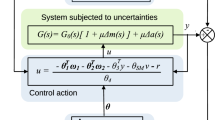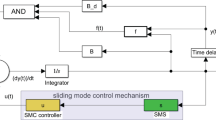Abstract
This paper investigates the event-triggered sliding mode control problem for discrete-time Markov jump systems under the unavailable states and partially unknown transition probabilities. To save the limited computational source, an event-triggered scheme is implemented to determine whether the current data should be sent or not, and an observer is constructed to estimate the unmeasurable states of the system. Then, on the basis of the Lyapunov functional technique, the sufficient conditions of stochastic stability for the closed-loop system are derived. Moreover, the sliding mode controller based on event-triggered mechanism is designed to ensure that the state trajectories of the closed-loop system can be driven onto the predefined sliding manifold and maintain there for all subsequent time. Finally, a numerical example is utilized to demonstrate the effectiveness of the proposed method.
Similar content being viewed by others
References
J. Y. Hung, W. Gao, and J. C. Hung, “Variable structure control: a survey,” IEEE Transactions on Industrial Electronics, vol. 40, no. 1, pp. 2–22, 1993.
K. Furuta and M. Morisada, “Sliding mode control of discrete systems,” Transactions of the Society of Instrument & Control Engineers, vol. 25, no. 2, pp. 145–152, 1989.
L. Zhao, H. Zhang, Y. N. Yang, and H. J. Yang, “Integral sliding mode control of a bilateral teleoperation system based on extended state observers,” International Journal of Control Automation & Systems, vol. 15, no. 6, pp. 1–8, 2017.
Y. Y. Wang, H. R. Karimi, H. Shen, Z. J. Fang, and M. X. Liu, “Fuzzy-model-based sliding mode control of nonlinear descriptor systems,” IEEE Transactions on Cybernetics, 2018. DOI:10.1109/TCYB.2018.2842920
G. Bartolini, A. Ferrara, and V. I. Utkin, “Adaptive sliding mode control in discrete-time systems,” Automatica, vol. 31, no. 5, pp. 769–773, 1995.
D. W. Qian, C. D. Li, S. G. Lee, and C. Ma, “Robust formation maneuvers through sliding mode for multi-agent systems with uncertainties,” IEEE/CAA Journal of Automatica Sinica, vol. 5, no. 1, pp. 342–351, 2018.
D. Y. Yao, R. Q. Lu, Y. Xu, and H. Y. Li, “Adaptive sliding mode control of switched systems with different input matrix,” International Journal of Control Automation & Systems, vol. 15, no. 6, pp. 2500–2506, 2017.
Y. Y. Wang, Y. B. Gao, H. R. Karimi, H. Shen, and Z. Fang, “Sliding mode control of fuzzy singularly perturbed systems with application to electric circuit,” IEEE Transactions on Systems Man & Cybernetics: Systems, vol. 48, no. 10, pp. 1667–1675, 2018.
H. Y. Li, Y. Y. Wang, D. Y. Yao, and R. Q. Lu, “A sliding mode approach to stabilization of nonlinear Markovian jump singularly perturbed systems,” Automatica, vol. 97, pp. 404–413, 2018.
M. Liu, L. X. Zhang, P. Shi, and Y. X. Zhao, “Sliding mode control of continuous-time Markovian jump systems with digital data transmission,” Automatica, vol. 80, pp. 200–209, 2017.
J. Tao, Z. G. Wu, H. Y. Su, Y. Q. Wu, and D. Zhang, “Asynchronous and resilient filtering for Markovian jump neural networks subject to extended dissipativity,” IEEE Transactions on Cybernetics, 2018. DOI:10.1109/TCYB.2018.2824853
B. Chen, Y. G. Niu, and Y. Y. Zou, “Sliding mode control for stochastic Markovian jumping systems with incomplete transition rate,” IET Control Theory & Applications, vol. 7, no. 10, pp. 1330–1338, 2013.
Z. L. He, Z. W. Gao, and J. J. Bai, “Analysis and synthesis of uncertainty singular Markov switched systems based on the sliding mode control,” Advanced Materials Research, vol. 846–847, pp. 107–111, 2013.
N. Xiao, L. H. Xie, and M. Y. Fu, “Stabilization of Markov jump linear systems using quantized state feedback,” Automatica, vol. 46, no. 10, pp. 1696–1702, 2010.
L. G. Wu, P. Shi, and H. J. Gao, “State estimation and sliding-mode control of Markovian jump singular systems,” IEEE Transactions on Automatic Control, vol. 55, no. 5, pp. 1213–1219, 2010.
J. Tao, R. Q. Lu, Z. G. Wu, and Y. Q. Wu, “Reliable control against sensor failures for Markov jump systems with unideal measurements,” IEEE Transactions on Systems, Man, and Cybernetics: Systems, vol. 49, no. 2, pp. 308–316, Dec 2017.
L. J. Gao, D. D. Wang, and Y. Q. Wu, “Non-fragile observer-based sliding mode control for Markovian jump systems with mixed mode-dependent time delays and input nonlinearity,” Applied Mathematics & Computation, vol. 229, no. 6, pp. 374–395, 2014.
A. K. Behera and B. Bandyopadhyay, “Event-triggered sliding mode control for a class of nonlinear systems,” International Journal of Control, vol. 89, no. 9, pp. 1961–1931, 2016.
Z. K. Tang, “Event-triggered consensus of linear discrete-time multi-agent systems with time-varying topology,” International Journal of Control Automation & Systems, vol. 16, no. 3, pp. 1179–1185, 2018.
C. Peng and T. C. Yang, “Event-triggered communication and H 8 control co-design for networked control systems,” Automatica, vol. 49, no. 5, pp. 1326–1332, 2013.
A. K. Behera, B. Bandyopadhyay, and J. Reger, “Discrete event-triggered sliding mode control with fast output sampling feedback,” International Workshop on Variable Structure Systems, 2016.
J. H. Zhang and G. Feng, “Event-driven observer-based output feedback control for linear systems,” Automatica, vol. 50, no. 7, pp. 1852–1859, 2014.
H. Zhang, Y. Shi, and A. S. Mehr, “Robust static output feedback control and remote PID design for networked motor systems,” IEEE Transactions on Industrial Electronics, vol. 58, no. 12, pp. 5396–5405, 2011.
D. Y. Yao, B. Zhang, P. S. Li, and H. Y. Li, “Event-triggered sliding mode control of discrete-time Markov jump systems,” IEEE Transactions on Systems, Man, and Cybernetics: Systems, 2018. DOI:10.1109/TSMC.2018.2836390
H. Zhang, Y. Shi, and A. S. Mehr, “Robust H 8 PID control for multivariable networked control systems with disturbance/noise attenuation,” International Journal of Robust & Nonlinear Control, vol. 22, no. 2, pp. 183–204, 2012.
H. J. Liang, L. C. Zhang, H. R. Karimi, and Q. Zhou, “Fault estimation for a class of nonlinear Semi-Markovian jump systems with partly unknown transition rates and output quantization,” International Journal of Robust & Nonlinear Control, vol. 28, no. 17, pp. 5326–5343, 2018.
L. Shi and Y. G. Kao, “A fuzzy control approach to stabilization of Markovian jump systems with general unknown transition probabilities,” International Journal of Fuzzy Systems, vol. 114, no. 21, pp. 1–11, 2015.
D. Y. Yao, R. Q. Lu, Y. Xu, and L. J. Wang, “Robust H 8 filtering for Markov jump systems with mode-dependent quantized output and partly unknown transition probabilities,” Signal Processing, vol. 137, pp. 328–338, 2017.
S. P. Meyn and R. L. Tweedie, Markov Chains and Stochastic Stability, Springer Science & Business Media, 2012.
O. L. V. Costa, M. D. Fragoso, and R. P. Marques, Discrete-time Markov Jump Linear Systems, Springer Science & Business Media, 2006.
P. Shi, E. K. Boukas, and R. K. Agarwal, “Control of Markovian jump discrete-time systems with norm bounded uncertainty and unknown delay,” IEEE Transactions on Automatic Control vol. 44, no. 11, pp. 2139–2144, 1999.
Y. F. Yin, G. D. Zhong, and X. D. Zhao, “Improved stability criteria for switched positive linear systems with average dwell time switching,” Journal of the Franklin Institute, vol. 354, no. 8, pp. 3472–3484, 2017.
Y. H. Zhang, J. Sun, H. J. Liang, and H. Y. Li, “Eventtriggered adaptive tracking control for multi-agent systems with unknown disturbances,” IEEE Transactions on Cybernetics, 2018. DOI:10.1109/TCYB.2018.2869084
Y. F. Yin, X. D. Zhao, and L. Zheng, “New stability and stabilization conditions of switched systems with mode-dependent average dwell time,” Circuits Systems & Signal Processing, vol. 36, no. 1, pp. 82–98, 2017.
V. I. Utkin, Sliding Modes in Control and Optimization, Springer Science & Business Media, 2013.
H. Y. Li, S. Y. Zhao, W. He, and R. Q. Lu, “Adaptive finitetime tracking control of full states constrained nonlinear systems with dead-zone,” Automatica, vol. 100, pp. 99–107, 2019.
X. D. Zhao, Y. F. Yin, B. Niu, and X. L. Zhen, “Stabilization for a class of switched nonlinear systems with novel average dwell time switching by T-S fuzzy modeling,” IEEE Transactions on Cybernetics, vol. 46, no. 8, pp. 1952–1957, 2016.
J. Y. Li, B. Zhang, R. Q. Lu, and Y. X, “Robust distributed H 8 state estimation for stochastic periodic systems over constraint sensor networks,” IEEE Transactions on Systems, Man, and Cybernetics: Systems, 2018. DOI:10.1109/TSMC.2018.2837047
Y. H. Zhang, H. Y. Li, J. Sun, and W. He, “Cooperative adaptive event-triggered control for multi-agent systems with actuator failures,” IEEE Transactions on Systems, Man and Cybernetics: Systems, 2018. DOI: 10.1109/TSMC.2018.2883907
X. B. Gao, H. R. Ren, D. Y. Yao, and Q. Zhou, “Finite-Time H ∞ filtering for discrete-time piecewise homogeneous Markov jump systems with missing measurements.” Circuits Systems & Signal Processing, vol. 37, no. 9, pp. 3927–3945, 2018.
Author information
Authors and Affiliations
Corresponding author
Additional information
Recommended by Associate Editor Guangdeng Zong under the direction of Editor Hamid Reza Karimi. This work was partially supported by the National Natural Science Foundation of China (61673072), the Guangdong Natural Science Funds for Distinguished Young Scholar (2017A030306014), the Innovative Research Team Program of Guangdong Province Science Foundation (2018B030312006), the Department of Education of Guangdong Province (2017KZDXM027, 2016KTSCX030), the Department of Education of Liaoning Province (LZ2017001) and the Science and Technology Planning Project of Guangdong Province (2017B010116006).
Wenshuai Lin received the B.S. degree in Electrical Engineering and Automation from Luojia College, Wuhan University, China, in 2016. He is currently working toward the M.S degree in Control Engineering from Guangdong University of Technology, China. His research interests include robust control and filtering, Markov jump systems, and networked control systems.
Xiaomeng Li received the M.S. degree from Hangzhou Dianzi University, Hangzhou, China, in 2018. She is pursuing the Ph.D degree in Control Science and Engineering with the School of Automation, at Guangdong University of Technology, Guangzhou, China. Her research interests include networked control systems, neural networks, multiagent systems.
Deyin Yao received the M.S. in Control Theory from Bohai University, Research Institute of Automation, Jinzhou, China in 2016, and he is currently pursuing the Ph.D. degree in School of Automation, Guangdong University of Technology, Guangzhou, China. His research interests include robust control, sliding mode control and neural control.
Xiaobin Gao received the B.S. degree in Automation from Guangdong University of Petrochemical Technology, China, in 2016. He is currently working toward the M.S degree in Control Science and Engineering from Guangdong University of Technology, China. His research interests include robust control and filtering, Markov jump systems, and networked control systems.
Qi Zhou received the B.S. and M.S. degrees in Mathematics from Bohai University, Jinzhou, China, in 2006 and 2009, and the Ph.D. degree in Control Science and Engineering from Nanjing University of Science and Technology, Nanjing, China, in 2013, respectively. Her research interest includes fuzzy logic control, neural control, and robust control for nonlinear systems.
Rights and permissions
About this article
Cite this article
Lin, W., Li, X., Yao, D. et al. Observer-based Event-triggered Sliding Mode Control for Markov Jump Systems with Partially Unknown Transition Probabilities. Int. J. Control Autom. Syst. 17, 1626–1633 (2019). https://doi.org/10.1007/s12555-018-0554-3
Received:
Revised:
Accepted:
Published:
Issue Date:
DOI: https://doi.org/10.1007/s12555-018-0554-3




